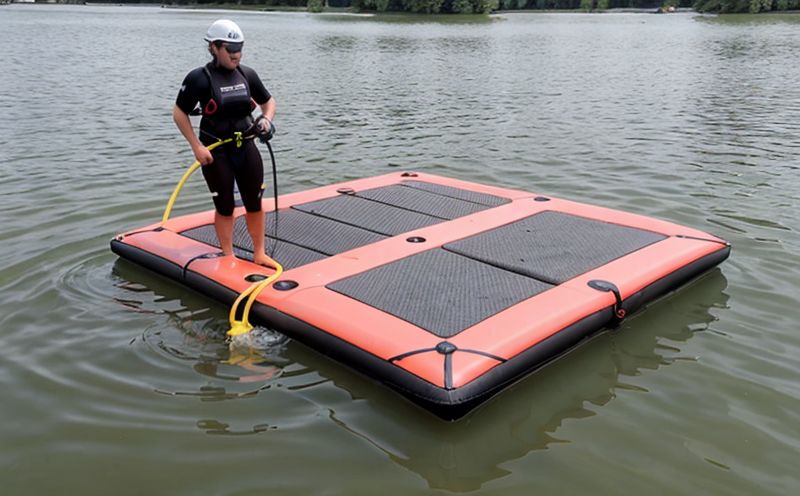Buoyancy Testing for Floating Docks
The Importance of Buoyancy Testing for Floating Docks Ensuring Safety and Efficiency
As the demand for floating docks continues to rise in various industries such as marine construction, aquaculture, and recreation, businesses are looking for ways to ensure their products meet the highest standards of quality and safety. One crucial laboratory service that plays a vital role in this process is Buoyancy Testing for Floating Docks, offered by Eurolab. This article will delve into the world of buoyancy testing, explaining its significance, advantages, and benefits.
What is Buoyancy Testing for Floating Docks?
Buoyancy testing for floating docks is a laboratory service that evaluates the ability of a floating structure to stay afloat in water. The test measures the buoyant force exerted on the dock by the surrounding water, taking into account factors such as density, volume, and stability. This critical evaluation helps manufacturers and operators identify potential issues with their designs or materials before they reach the market.
Why is Buoyancy Testing for Floating Docks Essential?
The importance of buoyancy testing for floating docks cannot be overstated. Here are some key reasons why businesses should prioritize this service
Safety First A floating dock that fails to stay afloat can pose significant risks to users, including damage to the structure itself and potential injury or loss of life.
Compliance with Regulations Many industries have strict regulations regarding buoyancy and stability. Non-compliance can lead to costly fines, penalties, and reputational damage.
Reduced Maintenance Costs Regular buoyancy testing helps identify areas where maintenance is required, preventing costly repairs and extending the lifespan of the structure.
Improved Design and Materials By analyzing test results, manufacturers can refine their designs and materials, resulting in more efficient and cost-effective products.
Key Benefits of Buoyancy Testing for Floating Docks
Eurolabs Buoyancy Testing for Floating Docks offers a range of benefits that can enhance business operations
Accurate Measurements Our state-of-the-art equipment provides precise measurements, ensuring accurate results and reliable data.
Comprehensive Reporting We provide detailed reports outlining test results, recommendations, and any areas requiring attention.
Customized Testing Solutions Our experts work closely with clients to develop tailored testing plans that meet specific industry requirements or client needs.
Rapid Turnaround Times With our streamlined processes and dedicated team, we ensure prompt delivery of results, minimizing downtime and maximizing efficiency.
Enhanced Customer Satisfaction By providing top-quality buoyancy testing services, businesses can build trust with clients and stakeholders, driving growth and loyalty.
Common Misconceptions about Buoyancy Testing for Floating Docks
There are several common misconceptions surrounding buoyancy testing for floating docks
Buoyancy testing is only necessary for large structures. Not true. Even smaller docks require regular testing to ensure stability and compliance with regulations.
Testing can be time-consuming and expensive. Actually, our service offers a cost-effective solution that saves businesses money in the long run by identifying potential issues early on.
Manufacturers can conduct their own buoyancy tests. While some manufacturers may choose to do so, expert laboratory testing by Eurolab provides unparalleled accuracy and reliability.
Frequently Asked Questions about Buoyancy Testing for Floating Docks
Q What types of floating docks require buoyancy testing?
A All types of floating docks, including commercial, recreational, and industrial structures, require regular buoyancy testing to ensure safety and compliance with regulations.
Q How often should I conduct buoyancy testing on my floating dock?
A Regular testing is essential. We recommend testing every 5-10 years or after any major modifications, depending on industry requirements and client needs.
Q Can I conduct buoyancy testing in-house or do I need to send samples to a laboratory?
A While some manufacturers may choose to conduct testing in-house, expert laboratory testing by Eurolab provides unparalleled accuracy and reliability.
Q What information do I need to provide for the testing process?
A We require detailed specifications of your floating dock, including dimensions, materials, and any relevant documentation or certifications.
Q How long does the testing process typically take?
A Our streamlined processes ensure rapid turnaround times, usually within a few days to a week, depending on the complexity of the test.
Conclusion
In conclusion, buoyancy testing for floating docks is an essential laboratory service that ensures safety, compliance with regulations, and improved efficiency. By partnering with Eurolab, businesses can benefit from accurate measurements, comprehensive reporting, customized testing solutions, rapid turnaround times, and enhanced customer satisfaction. Dont compromise on quality choose the trusted experts in buoyancy testing for your floating dock needs.
About Eurolab
As a leading laboratory service provider, Eurolab is dedicated to delivering high-quality testing and analysis services that meet the evolving needs of industries worldwide. Our team of experts specializes in providing comprehensive solutions for buoyancy testing, ensuring that businesses can trust their results and make informed decisions about product development, maintenance, and compliance.
With a focus on precision, reliability, and customer satisfaction, Eurolab continues to set the standard for laboratory services in the industry. Contact us today to learn more about how our Buoyancy Testing for Floating Docks can benefit your business.




